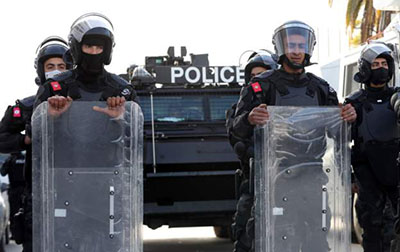
Tunisian police have blocked the path of hundreds of protesters who were trying to reach the parliament building in the capital, Tunis.
It is the latest in a series of demonstrations that have been fuelled by frustration at the lack of jobs and spiraling prices.
More than 1,000 young protesters had been arrested during the previous protests – and many of those demonstrating on Tuesday were calling for their release.
As the marchers gathered, inside parliament Prime Minister Hichem Mechichi was trying to win approval for a major reshuffle of his cabinet.
In his address to parliament’s opening session he warned that political stability was essential to end the current crisis facing the country.
Tunisia is in the midst of a severe economic downturn and its ailing public health sector is also under pressure from soaring numbers of Covid-19 infections.
The recent unrest began on the 10th anniversary of the Tunisian revolution, which ushered in democracy and triggered the Arab Spring uprisings across the region.
The 10th anniversary of the events in Tunisia that kick started what we call the Arab Spring, has coincided with a four-day national lockdown to control alarming rates of Covid-19 infections. The following night saw violent confrontations between groups of youths and the police in over a dozen working-class neighbourhoods across the country.
It wasn’t initially clear what triggered them, and civilians and officials were deeply split over how best to describe them – were they protests or riots? And what were they really all about?
Some said they were caused by impoverished, hungry, and angry young people. More than 600 of them, mostly teenagers, were later arrested. The next day dozens of protestors came out in the centre of the capital, Tunis, against the arrests, reviving revolutionary chants calling for “the fall of the regime”.
But few Tunisians are clear on what that would entail today. The last parliamentary and presidential election was less than two years go.
There is no question that people here are hurting – financially and socially – or that vital public services are declining. There have been annual bouts of civil unrest in recent years, usually demanding jobs and better pay. -BBC






